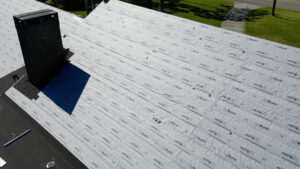Experiencing damage to your roof during hurricane season can be overwhelming. As you survey the destruction, one question looms large: “Will insurance cover roof damage?” It’s crucial to understand the ins and outs of your roof repair insurance and the specifics of insurance policies for roofs. Knowing your coverage can make a significant difference in managing repair costs and ensuring your home’s protection.
Understanding Roof Repair Insurance
When assessing whether insurance will cover roof damage, it’s vital to know what your policy includes. Roof repair insurance is designed to help you recover from unexpected damage. Typically, homeowners insurance covers roof damage caused by sudden, accidental events like storms or hail. However, policy details can vary widely.
Types of Coverage: Most policies offer either actual cash value or replacement cost coverage. Actual cash value policies factor in depreciation, which could mean you receive less money than needed for a full replacement. Replacement cost policies cover the total cost of a new roof without deducting for depreciation, providing more comprehensive protection.
Deductibles and Limits: Be aware of your policy’s deductible—the amount you pay out-of-pocket before insurance covers the rest. Also, check the policy limits. Some policies might have caps on how much they will pay, especially if your roof is older or if damage is extensive. Understanding these aspects is crucial to avoid unexpected expenses.
Exclusions and Conditions: Policies often come with exclusions or conditions. For instance, damage from neglect or general wear and tear might not be covered. It’s essential to read your policy thoroughly and understand what is and isn’t included.
Changes in Roof Replacement Coverage
Recent changes in Florida’s roofing laws add another layer of complexity. In May 2022, the 25% Roof Replacement Rule was replaced by Senate Bill 4-D. Previously, if over 25% of a roof was damaged, it had to be replaced entirely to comply with code requirements. The new law states that if the remaining roof meets Florida’s 2007 building code, only the damaged portion needs repair.
This new rule affects homes built or replaced after March 1, 2009. Homes built before this date that haven’t had a roof replacement will still need a full replacement if more than 25% of the roof is damaged. This change can impact the coverage you receive, as fewer policies might cover full replacements.
For a detailed look at this rule and its implications, check out the full text here: Florida Senate Bill 4-D.
The Role of Financing Options
With these complexities in mind, many homeowners find themselves facing unexpected costs. When insurance doesn’t cover the full extent of roof repairs or replacements, financial strain can become a reality. At AGU Roofing & Solar, we offer financing options designed to help manage these costs.
Whether you’re dealing with insurance gaps or need assistance with unexpected expenses, our financing solutions can ease your burden. We’re committed to ensuring that your home remains safe and secure, even when faced with financial challenges.
Navigating insurance coverage for roof damage involves understanding your policy, recent regulatory changes, and exploring financing options. Each factor plays a role in how you manage repair or replacement costs. If you have questions about your insurance policy or need assistance with financing, don’t hesitate to reach out to us at AGU Roofing & Solar. We’re here to guide you through every step and help ensure your home stays protected.
With this knowledge in hand, you can approach roof repairs with confidence and clarity.




